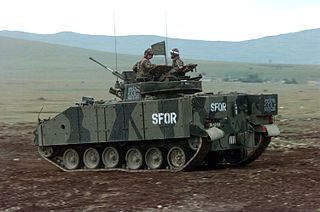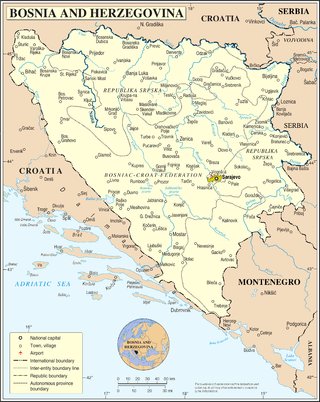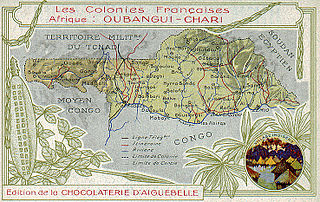
United Nations Security Council Resolution 1706, adopted on August 31, 2006, after recalling previous resolutions on the situation in Sudan, including resolutions 1556 (2004), 1564 (2005), 1574 (2004), 1590 (2004), 1591 (2005), 1593 (2004), 1663 (2006), 1665 (2006) and 1679 (2006), the Council expanded the mandate of the United Nations Mission in the Sudan (UNMIS) to include deployments in Darfur to enforce the Darfur Peace Agreement.

United Nations Security Council resolution 981, adopted unanimously on 31 March 1995, after reaffirming all resolutions on the situation in the former Yugoslavia, the council established the United Nations Confidence Restoration Operation in Croatia (UNCRO) for a period terminating 30 November 1995.

United Nations Security Council resolution 1136, adopted unanimously on 6 November 1997, after recalling Resolution 1125 (1997) regarding the situation in the Central African Republic, the Council authorised the continuation of the Inter-African Mission to Monitor the Implementation of the Bangui Agreements (MISAB) mission in the country for a further three months.

United Nations Security Council resolution 1152, adopted unanimously on 5 February 1998, after reaffirming resolutions 1125 (1997) and 1136 (1997) regarding the situation in the Central African Republic, the Council authorised the continuation of the Inter-African Mission to Monitor the Implementation of the Bangui Agreements (MISAB) mission in the country until 16 March 1998.

United Nations Security Council Resolution 1155, adopted unanimously on 16 March 1998, after reaffirming resolutions 1125 (1997), 1136 (1997) and 1152 (1998) regarding the situation in the Central African Republic, the Council authorised the continuation of the Inter-African Mission to Monitor the Implementation of the Bangui Agreements (MISAB) mission in the country until 27 March 1998.
United Nations Security Council resolution 1159, adopted unanimously on 27 March 1998, after reaffirming resolutions 1125 (1997), 1136 (1997), 1152 (1998) and 1155 (1998), regarding the situation in the Central African Republic, the council established the United Nations Mission in the Central African Republic (MINURCA).

United Nations Security Council resolution 1174, adopted unanimously on 15 June 1998, after recalling resolutions 1031 (1995), 1035 (1995), 1088 (1996), 1103 (1997), 1107 (1997), 1144 (1997) and 1168 (1998), the Council extended the mandate of the United Nations Mission in Bosnia and Herzegovina (UNMIBH) for a period terminating on 21 June 1999 and authorised states participating in the NATO led Stabilisation Force (SFOR) to continue to do so for a further twelve months.

United Nations Security Council resolution 1182, adopted unanimously on 14 July 1998, after reaffirming resolutions 1125 (1997), 1136 (1997), 1152 (1998), 1155 (1998) and 1159 (1998) regarding the situation in the Central African Republic, the Council extended the mandate of the United Nations Mission in the Central African Republic (MINURCA) until 25 October 1998.

United Nations Security Council resolution 1247, adopted unanimously on 18 June 1999, after recalling resolutions 1031 (1995), 1035 (1995), 1088 (1996), 1103 (1997), 1107 (1997), 1144 (1997), 1168 (1998), 1174 (1998) and 1184 (1998), the Council extended the mandate of the United Nations Mission in Bosnia and Herzegovina (UNMIBH) for a period terminating on 21 June 2000 and authorised states participating in the NATO led Stabilisation Force (SFOR) to continue to do so for a further twelve months.

United Nations Security Council resolution 1270 was adopted unanimously on 22 October 1999. After recalling resolutions 1171 (1998), 1181 (1998), 1231 (1999) and 1260 (1999) on the situation in Sierra Leone and Resolution 1265 (1999) on the protection of civilians in armed conflict, resolution 1270 adopted by the Security Council established the United Nations Mission in Sierra Leone (UNAMSIL) to assist in the implementation of the Lomé Peace Accord.
United Nations Security Council resolution 1291, adopted unanimously on 24 February 2000, after recalling resolutions 1234 (1999), 1258 (1999), 1273 (1999) and 1279 (1999) on situation in the Democratic Republic of the Congo, the Council expanded the United Nations Mission in the Democratic Republic of Congo (MONUC) to include additional tasks and extended its mandate until 31 August 2000.
United Nations Security Council resolution 1305, adopted on 21 June 2000, after recalling resolutions 1031 (1995), 1035 (1995), 1088 (1996), 1103 (1997), 1107 (1997), 1144 (1997), 1168 (1998), 1174 (1998), 1184 (1998) and 1247 (1999), the Council extended the mandate of the United Nations Mission in Bosnia and Herzegovina (UNMIBH) for a period terminating on 19 June 2001 and authorised states participating in the NATO-led Stabilisation Force (SFOR) to continue to do so for a further twelve months.

United Nations Security Council resolution 1357, adopted unanimously on 21 June 2001, after recalling resolutions 1031 (1995), 1035 (1995), 1088 (1996), 1103 (1997), 1107 (1997), 1144 (1997), 1168 (1998), 1174 (1998), 1184 (1998), 1247 (1999) and 1305 (2000), the council extended the mandate of the United Nations Mission in Bosnia and Herzegovina (UNMIBH) for a period until 21 June 2002 and authorised states participating in the NATO-led Stabilisation Force (SFOR) to continue to do so for a further twelve months.

United Nations Security Council resolution 1423, adopted unanimously on 12 July 2002, after recalling resolutions 1031 (1995), 1035 (1995), 1088 (1996), 1103 (1997), 1107 (1997), 1144 (1997), 1168 (1998), 1174 (1998), 1184 (1998), 1247 (1999), 1305 (2000), 1357 (2001) and 1396 (2002), the Council extended the mandate of the United Nations Mission in Bosnia and Herzegovina (UNMIBH) for a period until on 31 December 2002 and authorised states participating in the NATO-led Stabilisation Force (SFOR) to continue to do so for a further twelve months.

United Nations Security Council resolution 1551, adopted unanimously on 9 July 2004, after recalling previous resolutions on the conflicts in the former Yugoslavia, including resolutions 1031 (1995), 1088 (1996), 1423 (2002) and 1491 (2003), the council extended the mandate of the Stabilisation Force (SFOR) in Bosnia and Herzegovina for a further period of six months and welcomed the deployment of EUFOR Althea at the end of the SFOR's mandate.

United Nations Security Council resolution 1575, adopted unanimously on 22 November 2004, after recalling previous resolutions on the conflicts in the former Yugoslavia, including resolutions 1031 (1995), 1088 (1996), 1423 (2002), 1491 (2003) and 1551 (2004), the council defined the role of EUFOR Althea in Bosnia and Herzegovina as a legal successor to the Stabilisation Force (SFOR).

United Nations Security Council Resolution 1609 was adopted unanimously on 24 June 2005. After recalling previous resolutions on the situation in Côte d'Ivoire, the council extended the mandate of the United Nations Operation in Côte d'Ivoire (UNOCI) and supporting French forces for a further seven months until 24 January 2006.

United Nations Security Council resolution 1639, adopted unanimously on 21 November 2005, after recalling previous resolutions on the conflicts in the former Yugoslavia, including resolutions 1031 (1995), 1088 (1996), 1423 (2002), 1491 (2003), 1551 (2004) and 1575 (2004), the Council extended the mandate of EUFOR Althea in Bosnia and Herzegovina as a legal successor to the Stabilisation Force (SFOR) for a further twelve months.

United Nations Security Council Resolution 1722, adopted unanimously on November 21, 2006, after recalling previous resolutions on the conflicts in the former Yugoslavia, including resolutions 1031 (1995), 1088 (1996), 1423 (2002), 1491 (2003), 1551 (2004), 1575 (2004) and 1639 (2005), the Council extended the mandate of EUFOR Althea in Bosnia and Herzegovina as a legal successor to the Stabilisation Force (SFOR) for a further twelve months.

The Bangui Agreements are a 1997 negotiated peace accord in the Central African Republic (CAR). The accord was drawn up in Bangui to bring an end to the 1990s conflict between government and rebel forces. It was signed by the Patassé government, opposition parties and religious groups. The agreement envisaged several steps to sort out the views of various political factions, reorganize the defense establishment, and implement reforms in the country to improve its economy.

















